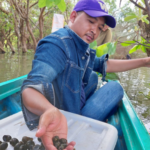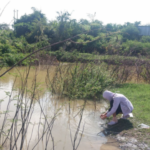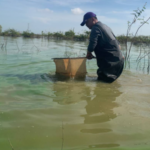Aquatic hosts of zoonotic diseases in the Cambodian Mekong
INTRODUCTION TO THE PROJECT
Zoonotic parasites are an important public health concern in the Indo-Chinese region, including in Cambodia. While public health efforts have made significant progress in reducing the prevalence of Schistosoma mekongi in Cambodia, measures to monitor and control the transmission of this and other parasites are on-going, and surveillance of intermediate hostsremains vital.
The aquatic intermediate hosts of zoonotic parasites commonly found in Cambodia, i.e., freshwater snails and fish, remain under-studied, with published studies being limited to a few provinces or appearing to be based on ad-hoc surveys. As the construction of dams changes the water flow and environmental parameters, some species of freshwater snails, might increase ; including species of medical concern and invasive species (e.g., Pomacea spp., which are known hosts of Angiostrongylus cantonensis). Additionally, Some species of freshwater fish serve as secondary aquatic hosts for the Opisthorchis viverrini liver flukes. Both freshwater snails and fishes are another important food source for many Cambodians.
Therefore, it is important to leverage regional support to ensure that resources are made available locally, including establishing national reference collections of voucher specimens of the intermediate hosts and parasites in order to provide local stakeholders direct access to research material.
We therefore propose to hold a programme consisting of a series of joint workshops and field surveys to bring together local (Cambodia) and regional (Thailand and Singapore) experts in public health, fisheries, biology and ecology to train stakeholders, including tertiary students, in basic understanding and skills to study the intermediate hosts of zoonotic parasites in the Mekong River basin of Cambodia.
PROJECT IN ACTION
Task 1: Provide a platform for a multi- disciplinary approach to combat zoonotic parasites via the management and conservation of medically-important freshwater snails and fish of the Mekong basin in Cambodia
Recruitment of potential participants for the programme via the Royal University of Agriculture, Phnom Penh
Task 2: Train national researchers in basic techniques to conduct surveys on medically important freshwater snails and fish in the Mekong basin in Cambodia
Workshops was held in 3 stages:
– Workshop 1 (March–April 2022) : including lectures on basic theories of malacology, fish biology and ecology, applied medical malacology, parasitology and field techniques (may be held online/hybrid)
– Workshop 2 (July–September 2022) : including field surveys and laboratory sessions—field surveys for participants to be conducted close to Phnom Penh to ensure that participants who are primary carers for their families to be able to participate fully
– Final Seminar (November 2022) : to report main findings, discussions for future research (may be held online/hybrid)
– Consolidation of data (December 2022) : deposition of voucher specimens in KH, TH, SG, and submission of final report, preparation for publication
Task 3: Collect preliminary data on the diversity, distribution, and parasite transmission by medically-important freshwater snails and fish in the Mekong basin in Cambodia
Field surveys was conducted by the main teams in 2 stages (Reconnaissance surveys to ground-truth information from literature review (KH) & Data-collection surveys by all main teams (KH, TH, SG))
- c) at Tboung Khmom province
- Field sampling of freshwater fish and snails: a) at Siem Reap province
- b) at Kratie province
NEXT STEPS
- As the current project has focused on knowledge transfer and capacity building, we would like to propose a follow-up project to carry out surveys and sampling at fixed locations (key habitats in the Upper Mekong River system in Cambodia, the Tonle River system and the habitat south of Phnom Penh – the Mekong Delta in Cambodia). In this project, we will include another key partner, the Cambodian Ministry of Health, targeting scientists who study zoonotic diseases in fish and snails, in order to extend the link between zoologists, parasitologists and public health scientists in universities to those in the government sector.
ESMFTCM ON THE WEB
XXXX
CONTACT
Project leader : Peng Bun NGOR (pengbun.ngor@gmail.com)
Associated researchers :
Dr Yanin LIMPANONT (yanin.lim@mahidol.ac.th)
Ting Hui Ng (ng.tinghui@gmail.com)
Countries involved : Cambodia, Thailand and Singapore



